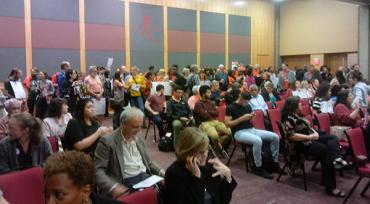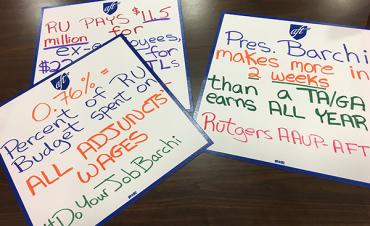Members of Rutgers AAUP-AFT and its two sister unions packed the faculty senate meeting at Rutgers University in New Jersey Sept. 21, holding signs, shouting from the back of the room and asking hard questions of university President Robert Barchi as he delivered the State of the University address. Union contracts expired months ago, and contract negotiations have been rocky at best.
Among their questions:
- Do you believe in equal pay for equal work for men and women?
- Why do you find it acceptable to deny healthcare to so many employees?
- When part-time lecturers teach such a large percentage of courses, why are their concerns so far down your list of priorities?
- Why are 20,000 unionized employees working without a contract?
“In the last few days, the president of this university got himself an extension of his contract,” AFT President Randi Weingarten said at a rally before the meeting, referring to the $705,000-a-year contract that extends Barchi’s presidency for two years. “We want him to be at least as concerned about the faculty as he is about himself.”
The grilling was just one of dozens of actions taken by Rutgers AAUP-AFT (which represents faculty at Rutgers) and its sister unions, the Union of Rutgers Administrators (which represents administrative workers) and the Health Professionals and Allied Employees (which represents staff at Rutgers’ Biomedical and Health Science’s division, its hospital and the affiliated services at Rowan University). All three unions are working with expired contracts; the Rutgers AAUP-AFT contract expired in June. Yet the administration has still offered no salary proposal—or any other serious proposal—and has not responded to dozens of proposals from the union negotiating team.
Members are feeling a combination of frustration and determination: Far from wilting from the battle, the union had 500 new members join this past summer. Demonstrations and open bargaining sessions have been packed.
Like so many contract proposals, those proffered by Rutgers AAUP-AFT demand fair compensation, benefits and working conditions. But the union goes far beyond the ordinary to also demand improvements that benefit the larger university community. Provisions for gender and race equity, for example, address hiring more faculty of color, achieving salary equity for women and faculty of color, correcting gender imbalance among more senior professors, and providing longer family leave for new faculty parents as well as lactation rooms for nursing mothers.
Among the union’s bread-and-butter issues are:
Salary equity
Cost-of-living raises, pay equity across three campuses, equal pay for equal work for female faculty and part-time lecturers, and offsets for salary compression so that longtime faculty are not making less than their newly hired colleagues.
Job security
Five-year contracts for graduate employees, tenure for nontenure-track faculty and longer-term appointments for part-time lecturers.
Academic freedom
Inside and outside the classroom, on social media, and in online communications.
Affordable healthcare and tuition
Lower healthcare costs, a freeze on undergraduate tuition, zero tuition for doctoral students, and more funding for Educational Opportunity Fund programs designed to increase student access, diversity and success.
While administrators have protested spending money to accommodate these proposals, the union points out Rutgers’ robust budget, including a 12.4 percent increase in management salaries, high administrator salaries (including 38 salaries over $500,000) and $99.2 million in athletics spending.
Rutgers AAUP-AFT, which represents 7,700 tenure-track and nontenure-track faculty, graduate employees, part-time lecturers, counselors and instructors, has made a point of standing in solidarity with other unions on campus to represent the needs of medical faculty colleagues, university staff and maintenance workers. Together, the unions—which include nearly 20,000 unionized employees—have also partnered with students and community groups to “Fight for $15,” pushing for a $15 minimum hourly wage and creating connections with the people outside the academic arena.
“Most of us at Rutgers went into education because we believe that education is a public good,” says Rutgers AAUP-AFT Vice President David Hughes. “We are a social justice union.” Leaders organized a Bargaining for the Common Good meeting last winter, probing new ways to use union contracts to advance policies that benefit the entire university community and the world.
Students understand that mission and have been a key part of the union’s activism. “My perception of the union is that it is the voice of the people,” says Carimer Andujar, a Rutgers student and president of UndocuRutgers. “The union works with the students day in and day out, [and] sees the impact [policy] has on the students. The board of governors isn’t able to see that.”
I’d like to see a community where the administration and the faculty are working together to build a space for all of the students who are coming to Rutgers to get the education that they’re paying for,” says Blake Ritchie, a part-time music theory instructor.
[Virginia Myers]


